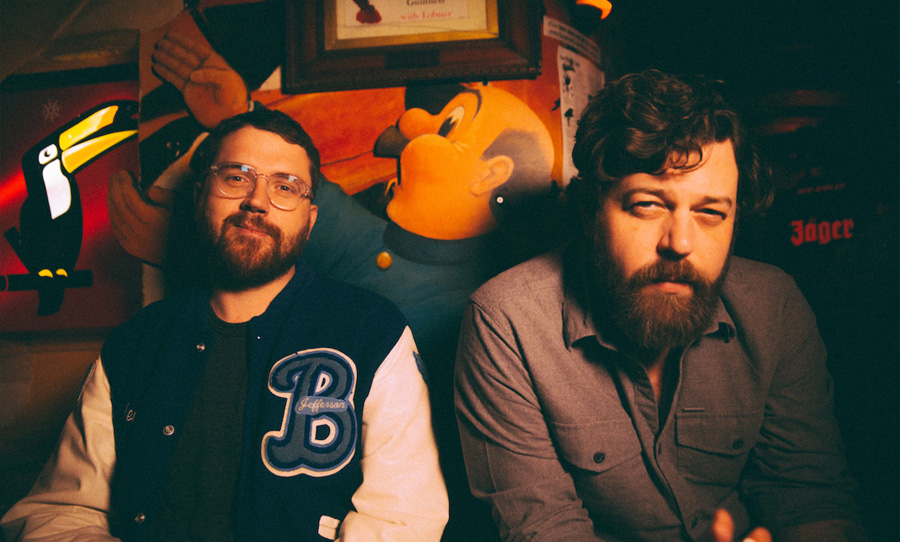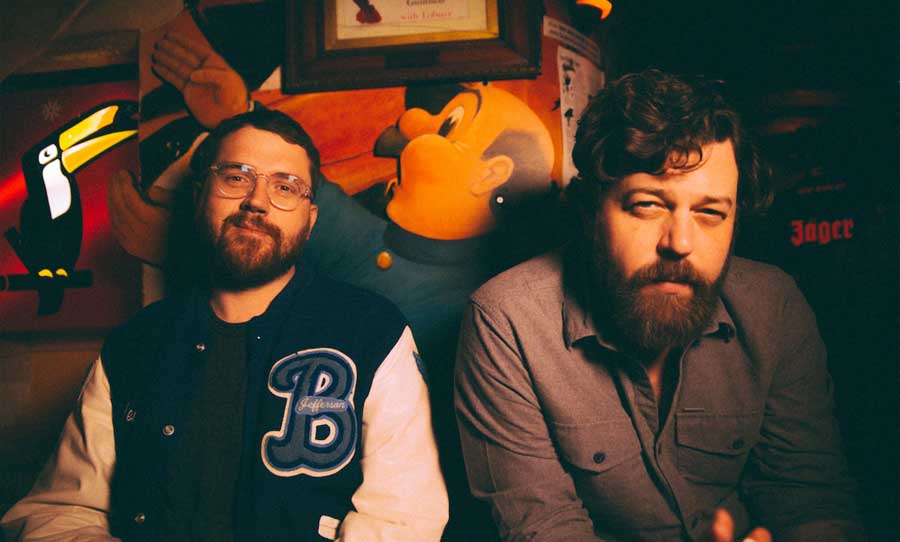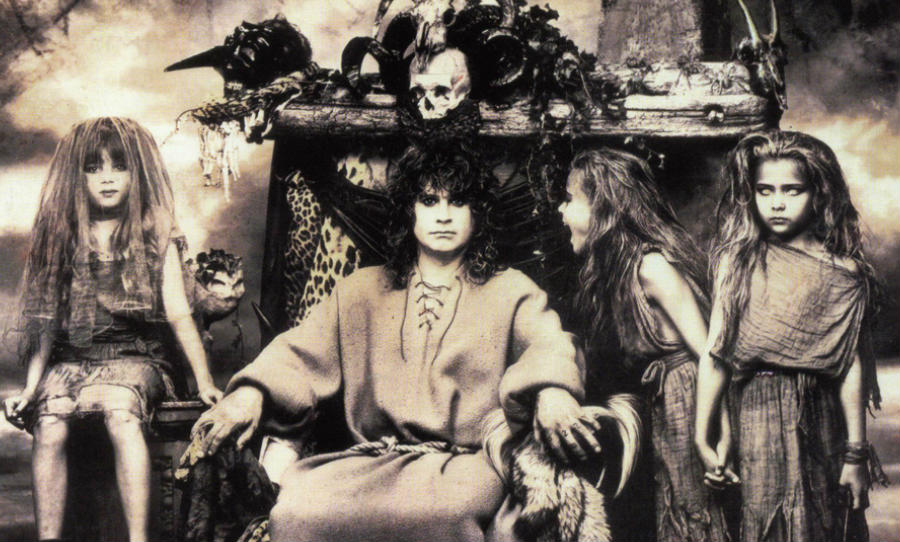The brand new album from Bear’s Den, So that you might hear me, borrows its name from a similarly titled (So That You Will Hear Me) poem from Spanish poet-diplomat Pablo Nerudo. Both works speak to a feeling of desperate communication, a one-way missive sent forth to someone who refuses to listen.
Andrew Davie, along with his musical sidekick Kevin Jones, is the man behind the album, the lyricist who lends Bear’s Den their often existential charm. As So that you might hear me finally reaches the world, we caught up to find out which stories brought this record to life.

As their new album So that you might hear me spreads its wings, we caught up with Andrew Davie from Bear’s Den.
HAPPY: Before this interview I read Before You Will Hear Me – the poem. I wanted to know what you took away from it?
ANDREW: To be honest, when I was writing the album’s lyrics a theme that kept coming up was trying to communicate with someone and not really succeeding, or feeling like you weren’t able to. I stumbled upon that poem and I just felt like it really encapsulated that feeling. I think across the album there are a few things sonically as well, we were messing around with lots of different ways of communicating through sound… we sampled sonar from submarines and morse code at the beginning of a song, we were just really interested in these ideas of throwing something out there, not sure if it’s going to land but just hoping that you can reach someone. And just on a personal level there’s a sense of disconnection, that’s what the album’s about.
HAPPY: Throwing something out there and hoping someone gets it sounds a lot like releasing an album.
ANDREW: (Laughs) It does, doesn’t it? Exactly. It was quite a personal thing, but then it embodied a sense of disconnection in a few different ways. We wanted to explore that.
HAPPY: In the poem the idea of ownership stood out to me. You always think of a songwriter or a poet as the owner of their art, but the poem really turned that around and gave it all to the subject. Do you ever get that feeling with your own music, that it becomes somebody else’s after a certain point?
ANDREW: Absolutely, for us I think part of songwriting that’s a difficult bit is when you realise… for me when I start writing a song you have a sense of ownership or something, but through each process of that, the ownership becomes shared more and more. Eventually it does become something you can’t claim to own any more, as in when you make it an album, it stops being yours. If it means something to somebody, then it’s just as much theirs as the person who wrote it, which I kind of like. When we’re performing live and we’re talking to fans who’ve had a connection to a record, that means more to me and is more interesting to me than whatever the intention was for writing the song. That’s when it comes alive, when lots of people have a different reaction to it.
HAPPY: Was there anyone in particular you were trying to talk to with these new songs?
ANDREW: Yes, definitely. Strangely it was my mum who was the main person I was trying to connect with. My mum’s had an ongoing, quite difficult relationship with alcohol over quite a long period of time and that’s been a real issue where I’ve tried to communicate with her about it. There have been small successes but big defeats in those conversations and it’s never really changed, and I think the album came from that relationship as a starting point, I wanted to talk about it as honestly as I could. And yeah, that’s where the genesis of that idea came from, but there are other relationships on that album, a different kind of not feeling like you’ve been heard, or something.
HAPPY: I’ve found the default way people interpret songs is that they’re about romantic relationships, when in reality many songs are about close friends or family, and other relationships.
ANDREW: Absolutely, but I would say that’s a very natural default and I definitely do it myself when I’m listening to songs. I think for us, it’s weird, maybe eight or nine years ago my sister said “you’re always writing these songs that are about girls and being broken hearted, you should write about different things. I think it would be interesting”, and as soon as I started doing that, weirdly people started connecting with the music more. I think actually those songs that are about friendship or are about family or something completely different – it’s funny how people will still bring that emotional response to it, whatever you’re writing about. It’s interesting to see how people have these intricate relationships but it’s the traditional romantic relationships… people write songs about them more I guess.
HAPPY: Does it matter to you what somebody’s interpretation of a song is?
ANDREW: I wouldn’t say… again it’s kind of that ownership thing, you can’t really own somebody’s response to anything. The only thing you can own is making sure you’ve worked really hard on something and it means what you wanted it to mean to you. If you care about that stuff and get that right, then hopefully other people will have a relationship with it. But again, that’s something that’s totally up to whoever listens to it. The idea of someone listening to our music and being affected by it, being moved by it, or being really happy about it, that’s amazing to us. So I don’t think we can start picking and choosing how people interact with it. To be honest, it’s genuinely way more interesting when… we get quite a lot of emails from fans and people talking to us about their relationship with songs and what a song means, it’s so interesting and often so moving. That’s an incredible thing about music that should be celebrated, and we shouldn’t try to stop that.
HAPPY: That’s a good perspective. You’ve said that you were writing from a more subconscious place on this record – what did a day of that kind of writing process usually look like?
ANDREW: Like a lot of really bad stuff (laughs). I think it was just trying not to overthink it and trying not to be too songwriter-y about it. Not to tie everything with a ribbon and bow to make it perfect. I guess I was really aware that the last couple of years I felt like I can’t really put a bell on this, I can’t organise my thoughts, I’m finding it quite confusing and difficult, and I think I wanted to be true to that in a way. So it was just a process of writing a lot of stuff and editing a lot later, you know if a line comes out and you keep coming back to it, you’re not sure if it makes sense, rather than worrying about that line and being scared a bit, it’s just keeping that line. It chews you up a little bit, and makes you want to write more. There were a few moments on the album where I just blurted something out, and that was really interesting to me, the idea of ‘oh shit I’ve said that just now, how do I pull back from there?’ It’s almost like when you’re in an argument and you say something worse than what you mean… you have to say something to know how you feel about something, so there were a few moments like that. It was interesting to write in that way, rather than writing into a story that was predestined.
HAPPY: Did you enforce any limitations or have any rituals to draw that stuff out?
ANDREW: The majority of the process was definitely stream of consciousness. I didn’t do any writing to time limits, but that probably would have been very helpful… I just went away for a couple of weeks, twice, to Cornwall and Dartmoor in the UK. I stayed in these Airbnbs – one had a piano – I stayed there for weeks and I’d pretty much write all day, go for a walk, come back and write more in the evening. I’d just write loads and loads of stuff, I’d just write as much as I could and it would get whittled down to what’s on the album, but there were lots of ideas flying around.
HAPPY: Was that the first time you’d done the whole lock-yourself-in-a-cabin thing?
ANDREW: I suppose on most of our albums, at some point I’ve done that. Kevin and I have started renting a recording studio in London as well, but I went away for a bit, got out of London just to think about stuff a bit. London’s quite an amazing city but it’s a little too easy to not work there, you know? It was good to get out, and then coming back we’d just work loads in our little studio. It involves a period of deep isolation then an intense period of collaboration as well.
HAPPY: You mentioned this before, but you’ve opened yourself up to a lot of new sounds over the years – which I think is nicely representative of a lot of contemporary acts. Is there anything in particular you attribute that diversity or willingness to experiment to?
ANDREW: I just think it’s an exciting time to be a fan of music now, you have so much access to so much music which is so cool. I think I’m hearing that in other records. Access to music is so good now, I like to think if I was a kid now how good my music taste would be, as opposed to when I was younger and saving up pocket money to buy as many CDs as you could. That was two or three a month or something, rather than just having everything. For us, having a rental ourselves where we could keep all our gear and keep it all set up… we bought a drum machine and a few synthesisers and stuff, and it was nice to experiment without having any time limitations. Starting songs from the most random sonic element and then building or inserting our band into that was just something that we’ve never done before.
HAPPY: That’s really cool, you had a space that you didn’t have to set up or down every day?
ANDREW: Yeah, it’s like a proper studio. You could go in and switch all the main switches and this whole world comes alive, ready to go and ready to record. We were getting through so much more work more quickly doing that. That was really exciting for us, we started out as a very acoustic-based band and that’s something that still really excites us, but I think it’s also nice when you’re being creative, you don’t know if it’s going to be an acoustic guitar or a synthesiser or a piano or a drum machine that could spark the next idea. This was the first time we had the luxury of just seeing what happens.
So that you might hear me is out now.



